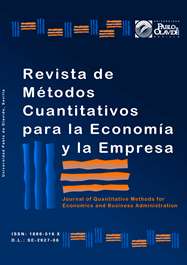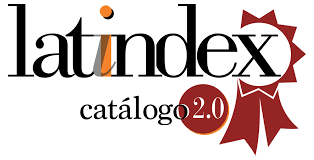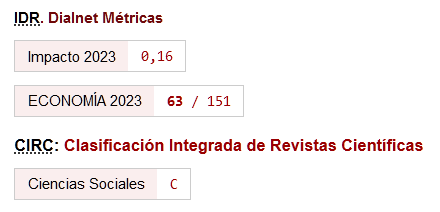Un problema de consenso para problemas de toma de decisiones multicriterio en grupo mediante relaciones de preferencia intervalares difusas lingüísticas
DOI:
https://doi.org/10.46661/revmetodoscuanteconempresa.2159Palabras clave:
Toma de decisiones multicriterio, consenso, relaciones de preferencia intervalares lingüísticas, group multicriteria decision making, consensus, linguistic interval fuzzy preference relations.Resumen
En el contexto de toma de decisiones multicriterio y bajo ciertas circunstancias, puede ocurrir que no se pueda expresar una cierta valoración mediante una única etiqueta lingüística, ya que puede haber duda en esa valoración. En este trabajo, presentamos un modelo de consenso para problemas de toma de decisiones en grupo con relaciones de preferencia intervalares lingüísticas. Este modelo está basado en dos criterios de consenso, una medida de consenso y una de proximidad, y en el concepto de coincidencia entre preferencias. Calcularemos ambos criterios en los tres niveles de representación de una relación de preferencia y diseñaremos un mecanismo de realimentación automático para guiar a los expertos en el proceso para alcanzar el consenso.
Descargas
Citas
Alonso, S.; Herrera-Viedma, E.; Chiclana, F.; Herrera, F. (2010). A Web Based Consensus Support System for Group Decision Making Problems and Incomplete Preferences. Information Sciences, 180:23 (2010), 4477 4495.
Bustince, H.; Fernandez, J.; Sanz, J.; Galar, M.; Mesiar, R. (2012). Multicriteria decision making by means of interval-valued Choquet integrals. Advances in Intelligent and Soft Computing, 107, 269–278.
Cabrerizo, F.J.; López-Gijón, J.; Ruíz-Rodríguez, A.A.; Herrera-Viedma, E. (2010a). A Model Based on Fuzzy Linguistic Information to Evaluate the Quality of Digital Libraries. Int. J. Inform. Technol. Decis. Making 9:3, 455–472.
Cabrerizo, F.J.; Moreno, J.M.; Pérez, I.J.; Herrera-Viedma, E. (2010b). Analyzing consensus approaches in fuzzy group decision making: advantages and drawbacks. Soft Computing 14:5, 451–463.
Cabrerizo, F.J.; Pérez, I.J.; Herrera-Viedma, E. (2010c). Managing the Consensus in Group Decision Making in an Unbalanced Fuzzy Linguistic Context with Incomplete Information. Knowledge-Based Systems 23:2, 169–181.
Chiclana, F.; Herrera, F.; Herrera-Viedma, E. (1998). Integrating three representation models in fuzzy multipurpose decision making based on fuzzy preference relations. Fuzzy Sets and Systems, 97(1), 33–48.
Herrera, F.; Herrera-Viedma, E. (1997). Aggregation operators for linguistic weighted information. IEEE Trans. System Man Cybernet. 27, 646–656.
Herrera, F.; Herrera-Viedma, E. (2000). Linguistic decision analysis: steps for solving decision problems under linguistic information. Fuzzy Sets and Systems 115, 67–82.
Herrera, F.; Herrera-Viedma, E.; Verdegay, J.L. (1995). A sequential selection process in group decision making with linguistic assessment. Inform. Sci. 85, 223–239.
Herrera, F.; Herrera-Viedma, E.; Verdegay, J.L. (1996). A model of consensus in group decision making under linguistic assessments. Fuzzy Sets and Systems 78, 73–87.
Herrera, F.; Herrera-Viedma, E.; Verdegay, J.L. (1997a). A rational consensus model in group decision making under linguistic assessment. Fuzzy Sets and Systems 88,31–49.
Herrera, F.; Herrera-Viedma, E.; Verdegay, J.L. (1997b). Linguistic Measures Based on Fuzzy Coincidence for Reaching Consensus in Group Decision Making. International Journal of Approximate Reasoning 16, 309–334.
Herrera-Viedma, E.; Alonso, S.; Chiclana, F.; Herrera, F. (2007a). A consensus model for group decision making with incomplete fuzzy preference relations. IEEE Trans. Fuzzy Syst. 15, 863–877.
Herrera-Viedma, E.; Chiclana, F.; Herrera, F.; Alonso, S. (2007b). Group Decision-Making Model with Incomplete Fuzzy Preference Relations Based on Additive Consistency. IEEE Transactions on Systems, Man and Cybernetics, Part B, Cybernetics, 37:1, 176–189.
Herrera-Viedma, E.; Herrera, F.; Chiclana, F. (2002). A consensus model for multiperson decision making with different preference structures. IEEE Transactions on Systems Man and Cybernetics Part A - Systems and Humans 32 394–402.
Herrera-Viedma, E.; Martínez, L.; Mata, F.; Chiclana, F. (2005). A consensus support system model for group decision-making problems with multi-granular linguistic preference relations. IEEE Trans. Fuzzy Syst. 13, 644–645.
Jiang Y. (2007). An approach to group decision making based on interval fuzzy preference relations. Journal of Systems Science and Systems Engineering, 16:1, 113–120.
Kacprzyk, J. (1987). On some fuzzy cores and “soft” consensus measures in group decision making, en The Analysis of Fuzzy Information (J. Bezdek Ed.). CRC Press, 119–130.
Kacprzyk, J.; Fedrizzi, M. (1986). “Soft” consensus measure for monitoring real consensus reaching processes under fuzzy preferences. Control Cybernet. 15, 309–323.
Kacprzyk, J.; Fedrizzi, M. (1988). A “soft” measure of consensus in the setting of partial (fuzzy) preferences. European J. Oper. Res. 34, 316–323.
Mata, F.; Martínez, L.; Herrera-Viedma, E. (2009). An adaptive consensus support model for group decision making problems in a multi-granular fuzzy linguistic context. IEEE Transactions on Fuzzy Systems, 17(2), 279–290.
Pérez, I.J.; Cabrerizo, F.J.; Herrera-Viedma, E. (2011). Group Decision Making Problems in a Linguistic and Dynamic Context. Expert Systems with Applications 38:3, 1675–1688.
Xu, Z.S. (2005). An approach to group decision making based on incomplete linguistic preference relations. International Journal of Information Technology and Decision Making 4(1), 153–160.
Xu, Z.S. (2007). A survey of preference relations. International Journal of General Systems 36, 179–203.
Xu, Z.S. (2010). Interactive group decision making procedure based on uncertain multiplicative linguistic preference relations. Journal of Systems Engineering and Electronics 21, 408–415.
Yager, R.R. (1988). On ordered weighted averaging aggregation operators in multicriteria decision making. IEEE Trans. Systems Man Cybernet. 18, 183–190.
Zadeh, L.A. (1975a). The concept of a linguistic variable and its applications to approximate reasoning. Part I. Information Sciences 8(3), 199–249.
Zadeh, L.A. (1975b). The concept of a linguistic variable and its applications to approximate reasoning. Part II. Information Sciences 8(4), 301–357.
Zadeh, L.A. (1975c). The concept of a linguistic variable and its applications to approximate reasoning. Part III. Information Sciences 9(1), 43–80.
Descargas
Publicado
Cómo citar
Número
Sección
Licencia
Derechos de autor 2012 Revista de Métodos Cuantitativos para la Economía y la Empresa

Esta obra está bajo una licencia internacional Creative Commons Atribución-CompartirIgual 4.0.
El envío de un manuscrito a la Revista supone que el trabajo no ha sido publicado anteriormente (excepto en la forma de un abstract o como parte de una tesis), que no está bajo consideración para su publicación en ninguna otra revista o editorial y que, en caso de aceptación, los autores están conforme con la transferencia automática del copyright a la Revista para su publicación y difusión. Los autores retendrán los derechos de autor para usar y compartir su artículo con un uso personal, institucional o con fines docentes; igualmente retiene los derechos de patente, de marca registrada (en caso de que sean aplicables) o derechos morales de autor (incluyendo los datos de investigación).
Los artículos publicados en la Revista están sujetos a la licencia Creative Commons CC-BY-SA de tipo Reconocimiento-CompartirIgual. Se permite el uso comercial de la obra, reconociendo su autoría, y de las posibles obras derivadas, la distribución de las cuales se debe hacer con una licencia igual a la que regula la obra original.
Hasta el volumen 21 se ha estado empleando la versión de licencia CC-BY-SA 3.0 ES y se ha comenzado a usar la versión CC-BY-SA 4.0 desde el volumen 22.










